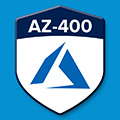
Duration: 5 Days
 This course is for experienced programmers who design, build and host Cloud solutions in Azure. Participants should have some experience with Azure and must be able to program in at least one Azure-supported language such as C#, Node.js, etc. This course covers topics such as performance, instrumentation, logging, integrating & managing APIs, and messaging architectures.
Course Fee: £2,199+VAT...Read more
This course is for experienced programmers who design, build and host Cloud solutions in Azure. Participants should have some experience with Azure and must be able to program in at least one Azure-supported language such as C#, Node.js, etc. This course covers topics such as performance, instrumentation, logging, integrating & managing APIs, and messaging architectures.
Course Fee: £2,199+VAT...Read moreAfter completing this course, students will be able to:
Candidates for this exam are DevOps professionals who combine people, process, and technologies to continuously deliver valuable products and services that meet end user needs and business objectives. DevOps professionals streamline delivery by optimizing practices, improving communications and collaboration, and creating automation. They design and implement strategies for application code and infrastructure that allow for continuous integration, continuous testing, continuous delivery, and continuous monitoring and feedback.
Module 1: Planning for DevOps
Hands-on: Agile Planning and Portfolio Management with Azure Boards
Module 2: Getting started with Source Control
Hands-on: Version Controlling with Git
Module 3: Scaling Git for enterprise DevOps
Hands-on: Code Review with Pull Requests
Module 4: Consolidating Artifacts & Designing a Dependency Management Strategy
Hands-on: Updating Packages
Module 5: Implementing Continuous Integration with Azure Pipelines
Hands-on: Enabling Continuous Integration with Azure Pipelines
Hands-on: Integrating External Source Control with Azure Pipelines
Hands-on: Integrate Jenkins with Azure Pipelines
Hands-on: Deploying a Multi-Container Application
Module 6: Managing Application Config and Secrets
Hands-on: Integrating Azure Key Vault with Azure DevOps
Module 7: Managing Code Quality and Security Policies
Hands-on: Managing Technical Debt with Azure DevOps and SonarCloud
Module 8: Implementing a Container Build Strategy
Hands-on: Modernizing Existing ASP.NET Apps with Azure
Module 9: Manage Artifact versioning, security & compliance
Hands-on: Manage Open Source Security and License with WhiteSource
Module 10: Design a Release Strategy
Module 11: Set up a Release Management Workflow
Hands-on: Configuring Pipelines as Code with YAML
Hands-on: Setting up secrets in the pipeline with Azure Key vault
Hands-on: Setting up and Running Functional Tests
Hands-on: Using Azure Monitor as release gate
Hands-on: Creating a release Dashboard
Module 12: Implement an appropriate deployment pattern
Hands-on: Feature Flag Management with LaunchDarkly and Azure DevOps
Module 13: Implement process for routing system feedback to development teams
Hands-on: Monitoring Application Performance
Module 14: Implement a mobile DevOps strategy
Module 15: Infrastructure and Configuration Azure Tools
Hands-on: Azure Deployments using Resource Manager Templates
Module 16: Azure Deployment Models and Services
Hands-on: Azure Automation – IaaS or PaaS deployment
Module 17: Create and Manage Kubernetes Service Infrastructure
Hands-on: Deploying a multi-container application to Azure Kubernetes Service
Module 18: Third Party Infrastructure as Code Tools available with Azure
Hands-on: Infrastructure as Code
Hands-on: Automating Your Infrastructure Deployments in the Cloud with Terraform and Azure Pipelines
Module 19: Implement Compliance and Security in your Infrastructure
Hands-on: Implement Security and Compliance in an Azure DevOps Pipeline
Module 20: Recommend and design system feedback mechanisms
Hands-on: Integration between Azure DevOps and Teams
Module 21: Optimize feedback mechanisms
The trainer will be Microsoft Azure Professional.
£2,199+VAT
Clientele ➞























Our Partners




